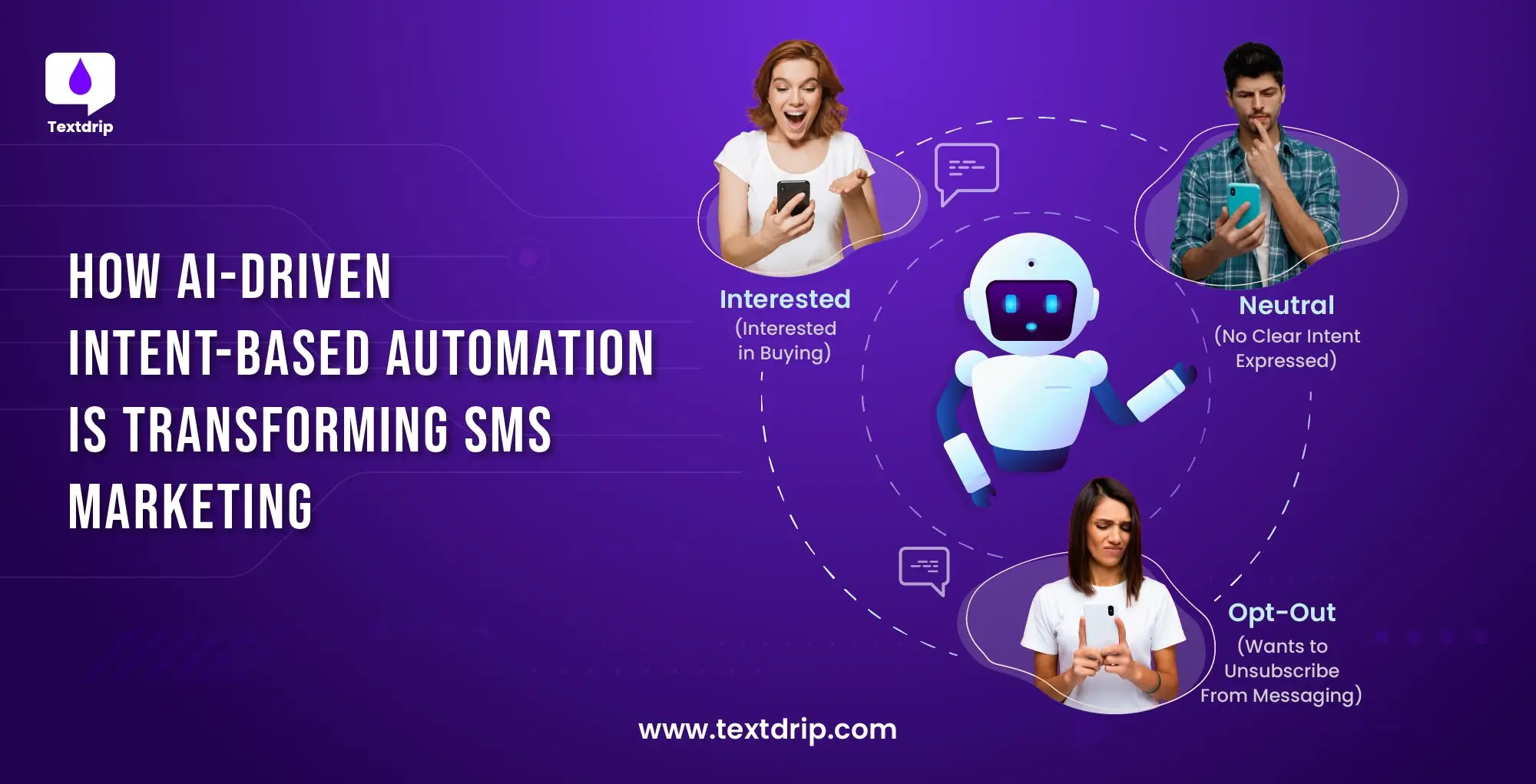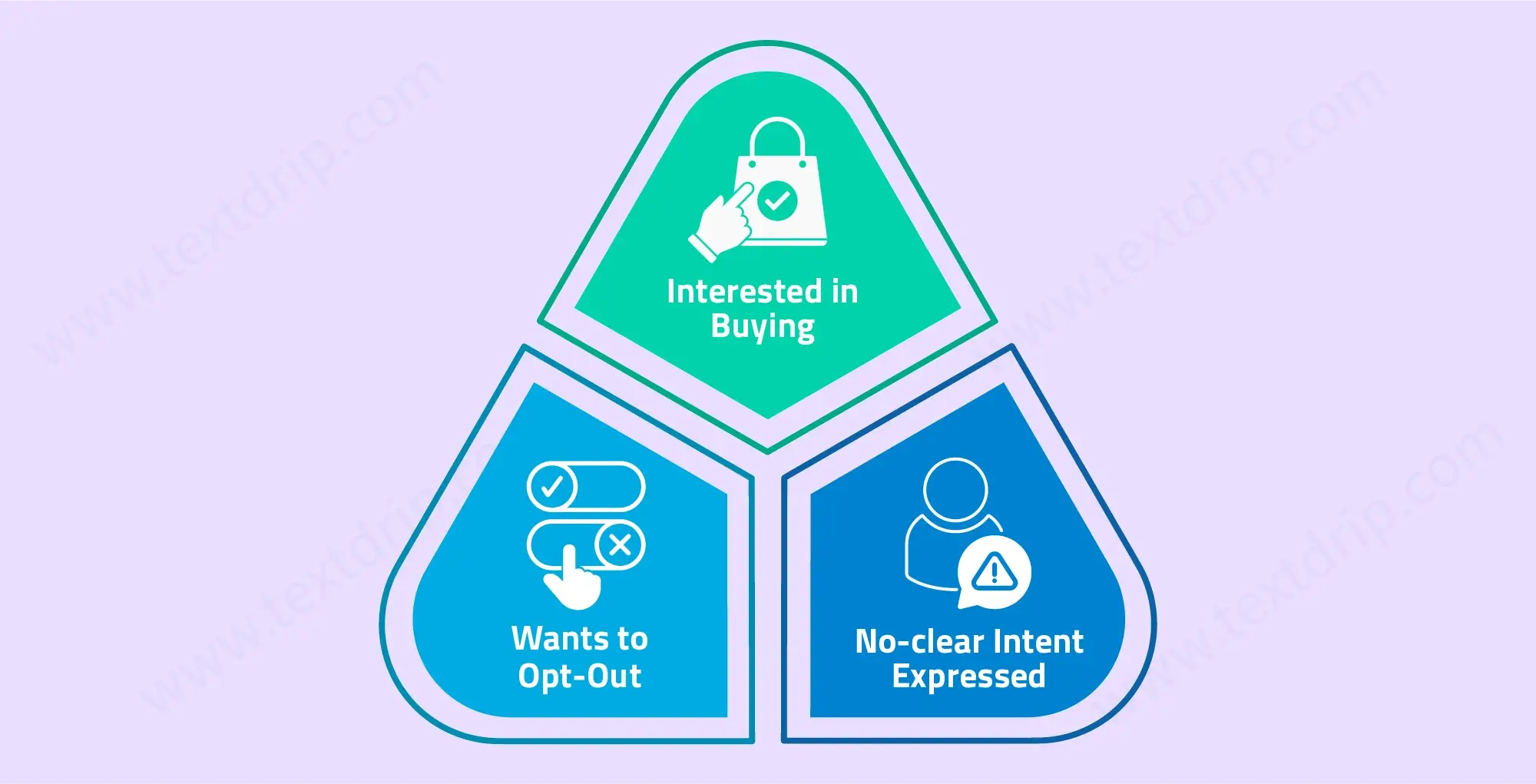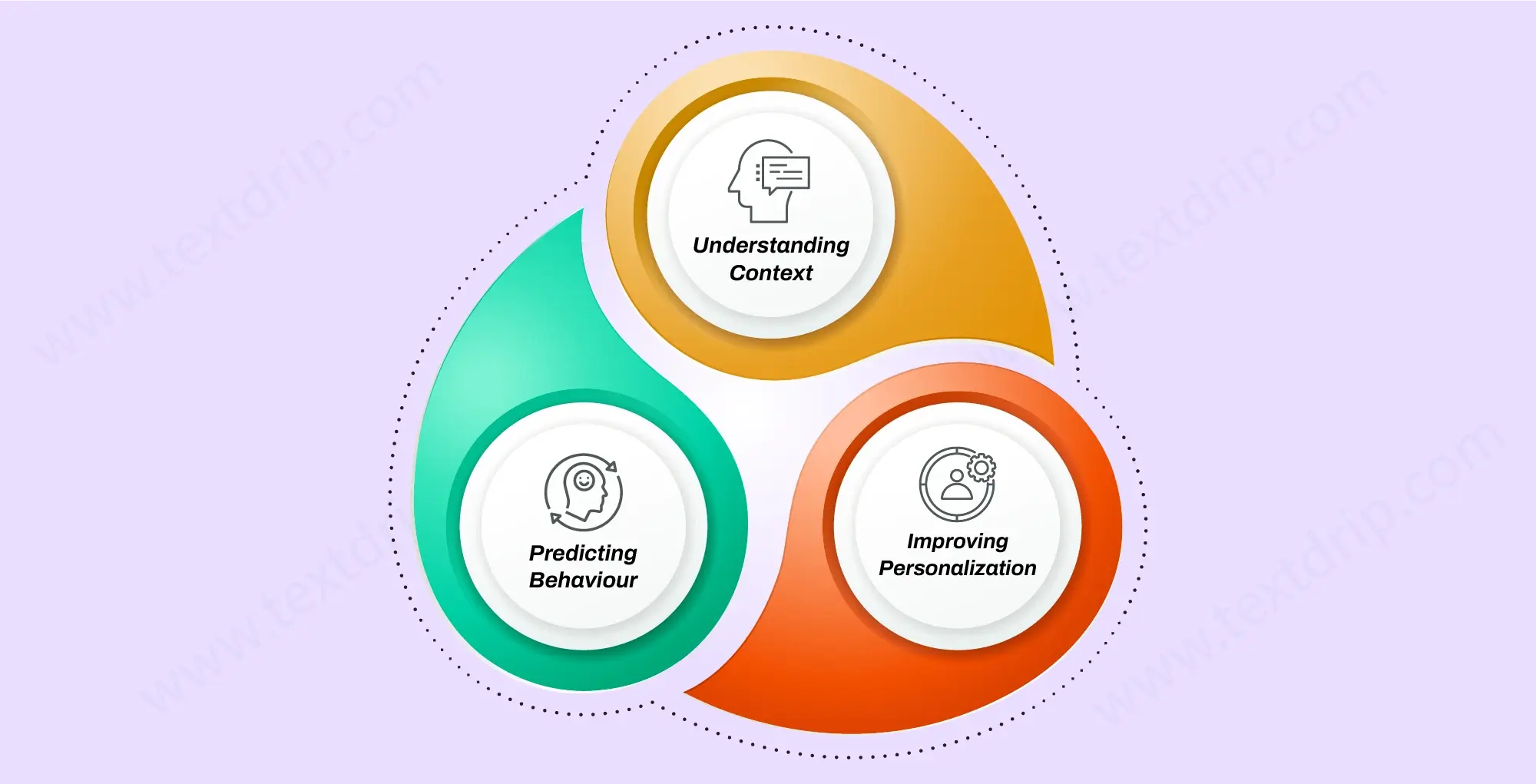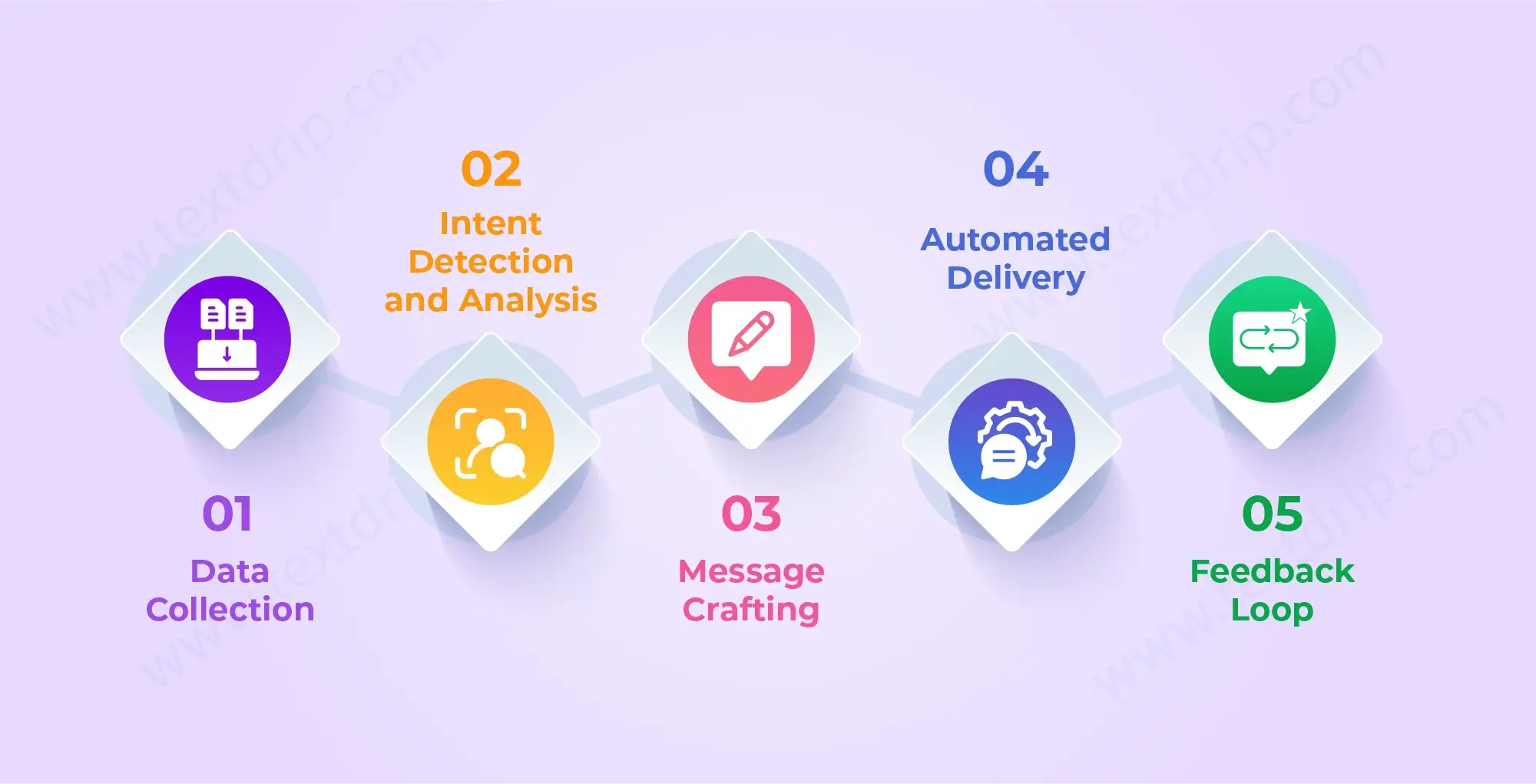18 Dec 2024
Dhaval Gajjar

18 Dec 2024
Dhaval Gajjar
We now live in a technologically advanced era where customers expect instant, personalized business communication. They expect business to understand their preferences and needs and respond almost instantly. Undoubtedly, SMS marketing is a powerful tool for reaching target audiences, but the real challenge lies in making these messages engaging and relevant.
Instead of bombarding customers with generic, one-size-fits-all texts, businesses are now turning to sophisticated AI text message generators to understand the intent behind each customer’s actions. This allows businesses to send highly personalized, timely, and relevant messages that drive real engagement and results. Through AI, businesses can connect with their target audience in a hyper-personalized manner, completely transforming SMS marketing.
This blog discusses how AI intent-based automation is revolutionizing how businesses connect with their audiences by building smarter workflows.
Let’s first start by understanding what AI-driven intent-based automation is.
AI-driven intent-based automation is cutting-edge technology that uses artificial intelligence to analyze customers’ preferences, behavior, and communication patterns to find their intent. Once the intent is found, it customizes SMS messages to match their intent perfectly to deliver the right message to the right person at the right time.
APIs such as positiveintent.ai use AI and ML algorithms to determine the intent of the text message response and classify intent into the following types.

1. Interested in Buying – When a customer expresses interest in your product/service by showing some positive engagement, they are classified into this intent category. They show interest in buying by using intent-based keywords like “What’s the cost?”, “I want to know more”, “do you offer discounts”, “how can I get started”, etc.
2. Neutral – Message responses that show no clear interest or intent are classified into the neutral category. Customers using intent keywords like “Not sure about it”, “I’ll think about it”, “Hmm.. maybe later” etc., shows their neutral interest.
3. Opt-Out – Message responses that show the clear intent not to receive any future communication are classified as opt-out intent. When customers respond with “I’m not interested”, “No, thank you”, and “Remove me from your list”, it shows that they are not interested in receiving any further messages from the business.
By integrating such APIs with the existing CRM/SMS marketing platform, businesses can send automated and relevant SMS and schedule their next SMS drip campaign according to the intent expressed by the customers.
Let’s understand it through a simple example.
For example,
Scenario:
A potential customer receives promotional SMS from your business like this:
Hi [Customer Name], we have an exclusive offer just for you! Reply ‘INFO’ for more details or ‘BUY’ to make a purchase today!
The customer responded with the keyword “INFO.”
Now, based on the response, API analyzes customer’s intent of seeking more information. So, it sends the automated message like this:
Thank you for your interest, [Customer Name]! Here’s more info about our offer: [Product Details]. Would you like to proceed with a purchase? Reply ‘YES’ to buy or ‘NO’ to cancel.
Customer revert with “YES”
Now, API understand customer’s intent of buying so it triggers the automated response like this:
Great! We are processing your order now. You will receive a confirmation shortly.
Even API adds the customer to the sales funnel and sends follow-up messages, order tracking SMS, or reminder messages if the customer frequently visits the online store but do not complete the purchase. In all these cases, AI can identify their intent to buy and send relevant, personalized messages with a discount code or a reminder about their abandoned cart. This level of personalization obviously increases the possibility of engagement and conversion.
Simply put, AI adds a layer of intelligence to traditional SMS automation.
How?
Read on to get its answer.

AI understands the context of the inbound message by analyzing the purchase patterns, historical data, and real-time interactions to find out what exactly customers are looking for. For example, customers looking for travel packages may receive personalized SMS recommendations based on their preferences.
Besides, AI-powered APIs, like positiveintent.ai use predictive analytics to guess customer actions. Ummm…confused? Let us explain to you in a simple manner.
Let’s say a customer’s intent is to cancel the subscription.
Scenario:
A customer expressed their intent to cancel the subscription due to price concerns. He/she revert with intent keywords like “Too Expensive”, “I can’t afford it”, “The price is too high”, etc.
In such a case, intent-based AI tools automatically identify their intent to cancel the subscription and send them a retention SMS with extra discounts or benefits like this:
Hey [customer name]! We understand your budget concerns. How about the complementary month on us to reconsider? Renow now:[link].
How it works?
AI identifies the customer’s intent to cancel. Based on the intent keywords it sends customers a personalized SMS that aligns with their concern.
The SMS provides solutions like discounts, extra benefits, etc., to retain the customer.
Generally, traditional SMS campaigns send generic messages, but AI ensures that the messages are customized to each customer so that they feel valued and understood.
By improving intent-based automation, artificial intelligence transforms SMS marketing into a dynamic, interactive communication channel that helps build strong customer relationships.
The success of SMS marketing efforts depends on how effectively it can engage customers. Here is how intent-based automation improves engagement.
It delivers messages at the right time. There is a higher chance of getting a response from the customers who received the message at the right time. For example, an AI-driven intent-based platform like Textdrip can send reminders regarding a flash sale when customers browse similar products.
How does a platform do it?
It determines the intent of the customer and sends them a relevant message.
Besides that, intent-based automation helps businesses reduce spam texting.
How?
They can integrate an AI-driven intent-based automation platform that focuses on customer intent and ensures that only relevant messages are sent. It reduces the chances of their messages being marked as spam.
Last but not least, intent-based automation encourages two-way communication by prompting customers to respond with specific keywords and creating a more engaging experience.
For example, a beauty brand can send a message like this –
We’ve noticed you love skincare! Reply ‘CARE for 10% off our new products.
This type of interaction keeps customers engaged while driving sales.
Now that you understand how intent-based automation improves customer engagement let’s understand how it actually works.
The AI-driven intent-based automation works in the following simple steps.

First of all, the AI system collects data from various sources like browsing behaviour, purchase history, and customer feedback. Once the data collection is completed, it uses advanced algorithms to determine the customer’s intent, such as whether the customer is just exploring, ready to buy, needs support, or wants to opt-out.
AI crafts tailored SMS content that aligns with the customer based on the identified intent. After that, the AI system (tool) sends the messages automatically at the right time to maximize its impact.
This AI system constantly learns from customer responses by refining its approach for future interactions.
The process looks simple, but its effects are optimal. This process ensures businesses can scale their SMS marketing efforts while maintaining high personalization and relevance.
If you are still not convinced to implement AI-driven intent-based automation in your SMS marketing efforts, the following benefits will make you believe in this approach.
Sending timely, relevant, and personalized messages offers higher engagement and conversions. It automatically boosts the ROI for SMS campaigns.
As businesses can target the most relevant customers, they can reduce unnecessary spending on mass messages.
When the customers receive tailored messages, it makes them feel understood and valued, which improves overall satisfaction.
AI lets businesses handle and manage the high volume of SMS campaigns without compromising personalization.
By integrating an automated SMS marketing platform like Textdrip with APIs like positiveintent.ai, businesses can experience easy and improved opt-out management.
In short, businesses should implement intent-based automation in their SMS marketing efforts for the following reasons.
For example, a retail store can use intent-based automation to notify customers about restocked items if they have previously shown interest in them. It increases their chance of a sale.
Positiveintent.ai is an API that uses AI and Machine Learning algorithms for automatic intent detection and classification. Let’s explore how it enhances SMS marketing.
Positiveintent.ai’s algorithms accurately determine the customer intent and ensure that the relevant messages are sent only. Besides, integrating it with the SMS marketing platform offers auto opt-out options. So that customers can easily unsubscribe or modify their preferences. It helps build trust and ensures compliance with, TCPA, 10DLC, and CAN-SPAM regulations.
The best thing about this API is that businesses can easily integrate it with their existing CRM systems. It provides businesses with an opportunity to create cohesive marketing strategies.
Let’s understand it through a simple example.
Picture this: an eCommerce brand can integrate positiveintent.ai with its SMS marketing platform to send tailored follow-ups to customers who browsed a product but didn’t purchase it. In such a case, their AI-driven intent-based automated SMS marketing platform can send an SMS like this:
Are you still thinking about a SmartTV? It’s 15% off for the next 48 hours! Buy it now!
In SMS marketing, opt-out rules have always played an important role. The good news is that in 2025, new intent-based opt-out rules will be introduced. It will empower customers to decide which businesses they want to hear from. As per the rules, businesses need to understand the intent behind the response they receive from the customers, which is not solely based on keyword-based opt-out.
Receiving responses like “Leave me alone” or “I don’t want to hear from you” businesses should understand that customers are no longer interested in receiving further messages from them. Here, integrating positiveintent.ai can help identify and classify intent based on responses. Once it detect and analyze the intent it also helps in auto opt-out and remove the contact from the future SMS campaigns. It is expected that it will totally change how opt-outs are handled, so businesses should future-proof their businesses by implementing intent-based automation to enhance SMS marketing efforts.
Let’s check out some practical applications of AI-driven intent-based automation in SMS marketing.
Scenario: A customer adds items to their shopping cart but didn’t complete the purchase.
How it works?
AI identifies a customer who has added items to their cart but hasn’t completed the buying process. Now, AI will send them personalized reminder messages with discounts or offers to encourage them to complete the purchase.
SMS Example
Customer response: “I forgot to check out, is the products that I added still available?”
AI Response SMS Example
We’ve noticed you have left your favorite items in the cart! Good news – they’re still available, but stock is limited. Complete your purchase within 48 hours to secure them: [link]. Need any help? Revert ‘Help’ and we’ll assist you.
Scenario: A customer interacts with the product or makes the purchase.
How it works?
AI analyses the purchase history and preferences and, based on it, recommends relevant products or services to customers with a clear CTA. (e.g. through previous interactions/event sign-ups).
SMS Example
Customer Response: “I loved [product name].”
AI Response SMS Example
Thanks for your kind words! We’re thrilled that you loved [product name]. If you need anything or have feedback, feel free to reach out. Have a great day!
Scenario: A business is promoting its upcoming event (e.g. webinar, sale, or launch) with an aim to drive registrations.
How it works?
Businesses can use AI-driven intent-based automation to identify customers’ interests and send them SMS like this:
SMS Example:
Customer Response: “What is this concert about? When it is scheduled?
AI Response SMS Example
Hey [customer name]! Thanks for your interest! The concert features [brief description about concert, bands, etc.] and is scheduled for [date and time]. Let us know if you need more details or want to book your tickets.
Scenario: After the recent purchase, business wants to gather feedback from the customer.
How it works?
The AI detects the opportunity to collect feedback based on customer behaviour or the recent purchase and sends them automated personalized follow-up messages.
Customer Response: “I am satisfied with the product but delivery could have been faster.”
AI Response SMS Example
Thanks [customer name] for shopping with us! We are glad that you liked our product. We’re sorry about the delivery delay and we will work to improve it. Your feedback helps us serve you better!
Scenario: Customers have not interacted with the business for some defined period.
How it works?
It seems like customers are not engaging enough. AI can identify the intent based on customer behaviours like inactivity (no logins, no recent purchase) and send them an SMS to inspire re-engagement.
AI Response SMS Example
We miss you [customer name]! We’ve noticed that you haven’t shopped with us lately! To welcome you back, we’re offering 25% off your next purchase. Use code – WELCOME25. Offer valid only for 24 Hours!. Click here to explore: [Link]. Don’t miss out!
These days, customer expectations are higher than ever. Therefore, adopting AI-driven intent-based automation is no longer just an option but has become a necessity. Whether you’re recovering abandoned carts, want to promote an event, or gather feedback, this technology ensures your SMS hits the right mark every time.
By integrating APIs like Positiveintent.ai with SMS marketing platforms like Textdrip, businesses can send highly personalized SMS that aligns with customers’ preferences and needs. Therefore, businesses can enjoy increased customer engagement, leading to improved ROI. Such APIs also helps to adhere to compliance laws and prevents the risk of paying penalties ranging from $500-$1000 per spam message. Integrating such APIs with your SMS marketing platform enhance your platform capabilities with advanced features like auto-opt-out. It ultimately makes your SMS marketing more effective and highly personalized.
So, start implementing AI-driven intent-based automation today and experience new heights in your SMS marketing campaign.
AI-driven automation refers to the use of artificial intelligence to automate tasks, processes, and communications by analyzing data, identifying patterns, and making decisions without human intervention. In SMS marketing, it enables personalized, timely, and efficient messaging.
Intent-based AI uses machine learning and natural language processing (NLP) to understand a user’s intent by analyzing their behavior, responses, and interactions. It helps businesses deliver relevant messaging aligned with customer needs.
AI uses data such as keywords, historical interactions, behavioral triggers, click rates, and demographics to detect and act on customer intent.
Intent-based automation instantly detects keywords like “STOP,” “CANCEL,” or “UNSUBSCRIBE” in customer responses. It processes these requests automatically, removing the recipient from the messaging list and ensuring compliance with regulations.